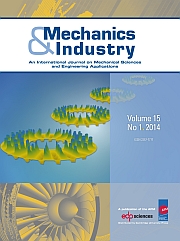Crossref Citations
This article has been cited by the following publications. This list is generated based on data provided by Crossref.
Asad, M.
Mabrouki, T.
Ijaz, H.
Aurangzeb Khan, M.
and
Saleem, W.
2014.
On the turning modeling and simulation: 2D and 3D FEM approaches.
Mechanics & Industry,
Vol. 15,
Issue. 5,
p.
427.
Abdellaoui, Lefi
and
Bouzid, Wassila
2016.
Thermomechanical approach for the modeling of oblique machining with a single cutting edge.
Machining Science and Technology,
Vol. 20,
Issue. 4,
p.
655.
Abdellaoui, Lefi
and
Bouzid, Wassila
2016.
Thermomechanical modeling of oblique turning in relation to tool-nose radius.
Machining Science and Technology,
Vol. 20,
Issue. 4,
p.
586.
Ijaz, Hassan
Danish, Mohd
Asad, Muhammad
and
Rubaiee, Saeed
2020.
A three-dimensional finite element-approach to investigate the optimum cutting parameters in machining AA2024.
Mechanics & Industry,
Vol. 21,
Issue. 6,
p.
615.
Abdellaoui, Lefi
Khlifi, Hassen
Bouzid Sai, Wassila
and
Hamdi, Hedi
2021.
Tool nose radius effects in turning process.
Machining Science and Technology,
Vol. 25,
Issue. 1,
p.
1.


